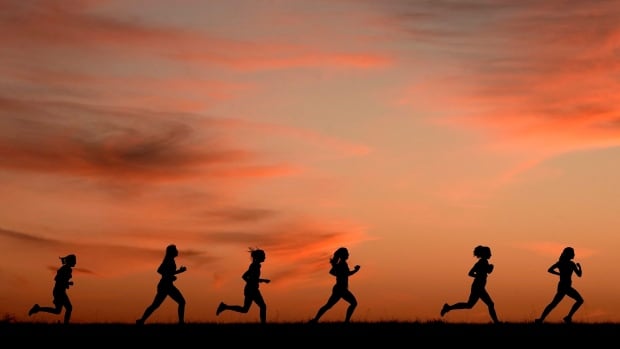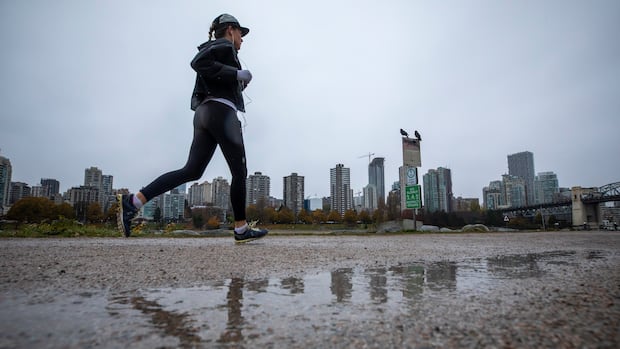Maybe you run in silence, or maybe you don’t wear headphones, or maybe you wear just one earbud so you can still listen to your music but also hear any approaching footsteps.
Maybe you plan through populated areas, or time your run so you’re back before the sun sets, or skip the forest trails entirely. Maybe you send your GPS co-ordinates to a trusted friend or loved one so they know where you are.
How do you prepare to head outside for a run? Running has arguably never been trendier, with race registrations at record highs, 4.7 million #running posts on TikTok and elite running brand Hoka’s sales up 34 per cent this year.
But for many women who participate in the sport, there’s a constant undercurrent of fear that they could be the next Laken Hope Riley, Eliza Fletcher or Mollie Tibbetts, who were all killed during or after runs in the United States. And now, there’s a new name to add to the list of high-profile cases of women murdered while exercising on their own: Alyssa Lokits.
“Alyssa was the best of us,” reads the obituary for the 34-year-old woman who was killed Oct. 14 in Nashville, Tenn. “Always poised, graceful, and beautiful, she was everyone’s champion.”
According to the police report, Lokits, an avid runner, was exercising on a popular hiking trail when a man started following her. Witnesses heard a woman screaming, “Help! He’s trying to rape me,” and then gunfire, noted the report.
Lokits was found suffering from a gunshot wound and died in hospital.
The next day, police arrested Paul Park, 29, and charged him with criminal homicide. The police said he was an “apparent stranger.”
The Instagram account Run For Alyssa encouraged people to walk or run for Lokits on Monday at 5 p.m., around the same time she was attacked, noting that “every woman deserves to feel safe.”
“Alyssa did everything right. She ran during the day, on a populated trail. She took self-defence classes and carried pepper spray. She fought back. And it wasn’t enough,” reads one of the posts.
“It is unacceptable for a woman to go on a run and not make it back home.”
Random attacks rare, but do happen
Despite the recent cases in the news, crime statistics indicate that these types of mid-run attacks are rare, and that women are far more likely to be killed by someone they know. In Canada, just one per cent of gender-related homicides were perpetrated by a stranger, according to Statistics Canada.
The rate of gender-related attempted murder of women and girls has been on the decline since 2017, StatsCan also said, and the largest proportion of attempts occurred at residential locations.
Still, women in Canada have been killed while exercising alone. There’s Vancouver’s Wendy Ladner-Beaudry, whose murder is still unsolved. In 2009, her body was found off a hiking trail in Pacific Spirit Park. Her husband said she would go for daily solo runs in the park.
And there’s the Toronto cold case of Margaret McWilliam, who was killed in 1987 after leaving home for a jog. Many in Ottawa are still rattled by the death of Ardeth Wood, who was killed in 2003 while cycling alone in the middle of the day. Christopher Myers pleaded guilty to the second-degree murder of Wood in 2008.
The family of Ardeth Wood honoured the Ottawa woman 10 years after she was killed.
Susan Ibach, 54, who lives just outside Ottawa in Manotick, Ont., says her safety is top of mind when she runs. She has completed over 20 marathons, including this summer’s Paris 2024 Marathon Pour Tous.
“I travel for work and frequently run in new cities and I have to be careful not to run in the dark, not to run on isolated roads, I try to stay in hotels close to popular running paths,” Ibach said in an email to CBC News.
“Even here in Ottawa, yes, it’s something I do think about.”
While training for the Paris marathon — which took place at night — Ibach says she wanted to do some of her long runs at night, too. But not without precautions. She reached out to her running club and asked whether anyone would be willing to run 10-kilometre loops with her, one person each at 8, 9, and 10 p.m.
“I didn’t want to be running alone at night,” she said.

Many women report feeling unsafe while running
According to a survey by athletic wear company Adidas last year, 92 per cent of the 4,500 women they surveyed in nine countries reported feeling concerned for their safety when they go for a run.
Half were afraid of being physically attacked. More than a third of women said they experienced physical or verbal harassment on runs, such as sexist comments or being followed.
Another survey by the website Runner’s World surveyed 2,000 women. Sixty per cent said they’d been harassed while running, while 25 per cent said they experienced sexual harassment while running regularly. Six per cent said they’d felt so threatened by the harassment that they feared for their lives.
A study from Simon Fraser University researchers looked at what makes trails attractive to runners and joggers — and found some women are less likely to run in the woods for fear of being attacked.
And a 2024 U.K. study with the University of Manchester found more than two-thirds of the women surveyed said they’d experienced some form of abuse while out running.
“Pick up the pace. Look strong. If I scream, will anyone hear me?” running influencer Laura Green said in a video about the internal thoughts of female runners out running alone.
Alongside the video, she wrote: “The murder of Alyssa Lokits reminds us once again, how even when we do everything right, running as a woman is never truly peaceful.”
Meawhile, new research out of Simon Fraser University found women trail runners were far more likely than men to report being afraid of other people and losing cellphone reception. The women were also more afraid of running into other people than they were of running into cougars.
“I think that women are just more concerned about their safety than men, and for good reasons,” Nadine Schuurman, a professor in SFU’s department of geography and the lead investigator on the paper, said in a June news release.
“We all see news stories about threats to women.”
A grisly history of attacks
Some of those more recent news stories include Eliza Fletcher, who was grabbed from a street while she was jogging before dawn near the University of Memphis on Sept. 2, 2022, and forced into an SUV. The body of the 34-year-old mother of two was found days later near a vacant duplex. Her accused killer will face trial in February.
In 2018, University of Iowa student Mollie Tibbetts disappeared while out for a run. Her body was found hidden among corn stalks near her small hometown of Brooklyn, Iowa Her killer was sentenced to life in prison.
The same year, Wendy K. Martinez, 35, was attacked during a run in Washington, D.C. She was stabbed in what police said was likely a random attack, dying after she staggered into a restaurant where customers tried but failed to save her life. The man who stabbed her was sentenced to 30 years.

There are many more, and not just in the U.S. They include Johannesburg school teacher Kirsten Kluyts, who was pregnant when she was killed.And Samantha Murphy, 51, of Australia, a mom of three.
Running groups and women’s forums regularly offer tips on how women can try to stay safer while exercising.
Ibach, the runner in Ottawa, says when she goes on night runs, she tends to stick to her own neighbourhood, so she can run to a friend’s house if she feels nervous.
“I also wear a runner ID tag on my wrist with my emergency information in the event something does happen,” Ibach said.
‘What is the alternative?’
Callie Rennison, a criminal justice professor at the University of Colorado who studies violence against women, told the Associated Press in February she wishes there was more emphasis on teaching men not to assault women rather than telling women what they should or should not do.
Rennison was interviewed in the wake of Riley’s murder earlier this year. The 22-year-old nursing student was found in the forested area of the University of Georgia campus after she was reported missing from a morning run.
The 26-year-old man later arrested on suspicion of murder did not know her. University of Georgia Police Chief Jeff Clark called the killing a crime of opportunity.
“I hope that women keep getting out there running, hiking, matriculating, climbing, working, and living their lives as they deserve,” Rennison said.
“While I lose hope on some days for us, what is the alternative? Trying to exist quietly doesn’t protect us either.”





